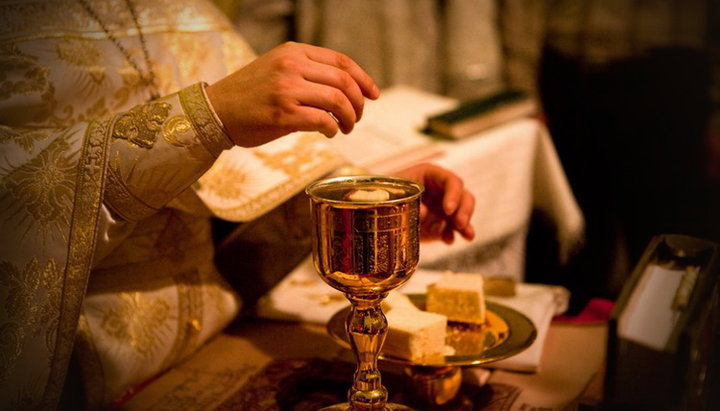
After the Lord's prayer, which we recite in the Divine Liturgy, the Celebrant blesses the people with the words: "Peace be with all". Truly, how much the Church wishes that the peace of God would guard the hearts of the faithful! After the answer of the people "and with your spirit", the Deacon urges the people: "Let us bow our heads to the Lord.". After the "To You, O Lord", pronounced by the people, while everyone bows before the Holy Gifts, the Celebrant recites the ”Prayer which is read when bowing our heads”. At this moment we bow as a gesture of deep humility and submission to our Almighty and glorious Lord and in honor of the sanctified Bread, which will soon be raised and transmitted to the faithful who have prepared to receive it.
While everyone is bowing their heads, the Celebrant, after expressing gratitude for the creation of manyfold beings, prays for everyone according to their need: "Sail with those who sail; travel with those who travel; heal the sick, Physician of our souls and bodies", because you are the doctor and healer of all people and the fulfillment of their needs. This bowing of heads is another manifestation of gratitude, which the Lord made us worthy to experience during these sacred moments before the living God, moments during which even the holy angels wish to "bow down". We experience in the Divine Liturgy the sublime glory of the Lord, the Godman, and admire together with the holy Angels the achievements of the Holy Spirit, and feeling close to the holy Apostles, we bow our heads to our Father. The prayer, as usual, is closed by the laudatory recitation of the Celebrant: "Through the grace, compassion, and love for mankind of Your only-begotten Son...".
The Minister also addresses another prayer - not to the Father as usual - but to the Son, our Lord Jesus Christ, and asks Him that he may come from the holy glorious throne of His Kingdom to sanctify us, and with His mighty hand to transmit to the Celebrants His pure Body and His precious Blood. As follows, the Lord Himself now with the hands of His Priests communes all the faithful.
The Lord, after His Ascension, was enthroned on the right side of the Father in heaven, but he at the same time is present with the faithful in the Divine Liturgy. This is the meaning of the phrase of this prayer: "You Who are enthroned with the Father on high and are present among us invisibly here". By His incarnation Christ came close to man and became man without leaving His divine Throne. With His Ascension, after completing the work of the Divine Economy, he ascends to His heavenly Throne. He returns to the right hand of the Father, but does not leave us alone: "I go away, and come again unto you" (John 14:28). With these words Christ promised to His Disciples something that applies to all members of the Church.
The Lord is not only with us, but comes to dwell in us. And Christ Himself with His holy hands transmits to the Celebrant Himself. And through the Celebrant to all the people. And a "great joy" is experienced "by all the people".
And with this last prayer to Jesus Christ finished, we are ready to partake of the divine Communion.
As before every great event, thus also now, the Deacon calls us to pay attention to the words of the Celebrant that will follow: The Deacon exclaims in a loud voice: "Let us be attentive". And the Cebrant, raising the consecrated Bread above the Holy Discos, exclaims "The Holy Gifts for the holy people of God". What is the meaning of these words? The Holy Gifts are intended for the holy people of God. Not everyone is allowed to approach the eternal mysteries. That is why the Celebrant does not indeed invite everyone. Holding in his hands the Holy Body of the Lord, he calls those who have believed in Christ, who have received holy Baptism, maintained their relationship with the Church, attend church regularly, observe fasting, confess and strive to live according to his will. He calls these people holy. In this sense, the Apostle Paul also addressed the Christians of the cities to whom he sent his Epistles; he sends his blessing to the Corinthians and adds: "with all the saints which are in all Achaia" (2 Cor. 1: 1).
The meaning of the term saint used here should not be confused, of course, with the Saints, which the Church has recognized and celebrates; after all, their canonization took place years after their bodily deaths.
Again, the term saint is not limited to certain pious Christians who are distinguished for the richness of their virtues and the holiness of their lives. The term saint also includes ordinary Christians who struggle but have not yet been able to reach the perfection of the Christian life. And they can reach out, commune and strengthen themselves in their multifaceted struggle.
Believers are called saints mainly because they share the Holy Body and Blood of our only true Lord. They become members of Christ Himself, flesh from His flesh, bones from His bones, and of course, as long as we are united with Him, we maintain harmony with Him and draw from this sanctification.
When the Celebrant exclaims: "For the holy people of God "the faithful, as if objecting, continue: "One is Holy, one is Lord, Jesus Christ, to the glory of God the Father". For no one has holiness by himself; nor is it an achievement of human virtue, but all have holiness from Him, the only Saint.
The Holy Lord is before us at the Holy Table. The moment of the Holy Communion has come. Lord, make us worthy to receive Your Body and Your Blood. Amen.





